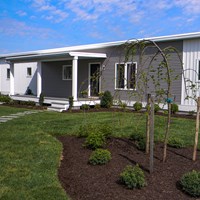Lessons Learned on the Journey to Bring Zero-Energy Modular Homes to Scale
A chronic shortage of affordable housing persists in the United States and the building construction sector has not kept up with productivity gains in manufacturing. In fact, single-family and multifamily residential construction productivity decreased from 2007 through 2020 (U.S. Bureau of Labor Statistics 2021).
For almost a decade, the authors have promoted zero-energy modular (ZEM) homes as a solution to bring all-electric, zero-energy homes to the affordable housing sector.
Presented at the 2022 ACEEE Summer Study on Energy Efficiency in Buildings, this paper describes the results of, and lessons learned from, ongoing ZEM programs in Vermont, Massachusetts, and Delaware.
Findings describe cost performance, implementation hurdles and solutions, and strategies for bringing ZEM homes to scale. The authors offer preliminary findings from research projects funded by the U. S. Department of Energy (DOE) and U.S. Department of Housing and Urban Development (HUD). These projects have studied the construction systems of home designs and factory processes.
The paper concludes with ways to decrease costs, increase construction productivity, and deliver homes that perform at zero energy.
Download PDF (new tab)